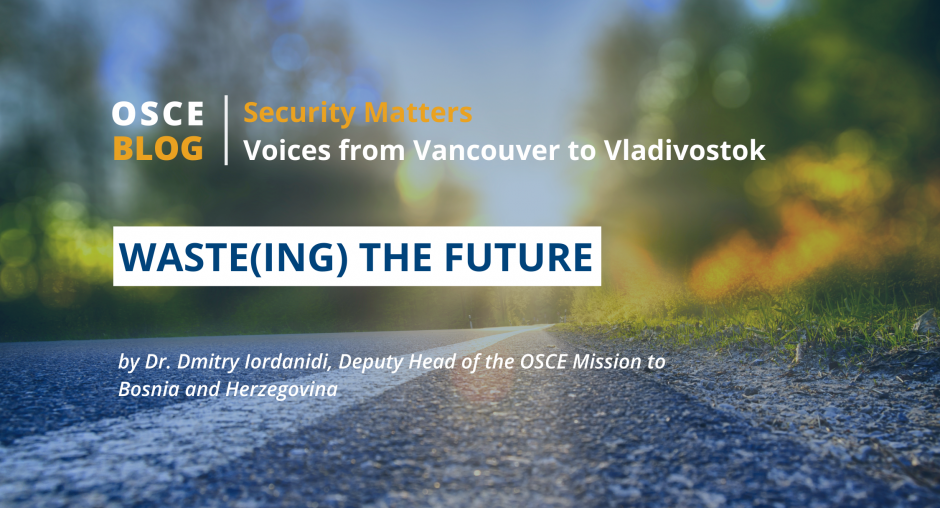Waste(ing) the future
Dr. Iordanidi has been Deputy Head of the Mission since June 2020. He works on the OSCE 2nd Dimension — economic and environmental issues — and through his engagement witnesses first-hand the effects of waste mis-management on the environment. This is his experience from the field.
According to the U.S. Environmental Protection Agency, if one excludes the small amount of plastics incinerated, every bit of plastic ever manufactured still exists today. This means that every piece of plastic you have ever used is still here, somewhere. You might even find it on your way to your favourite weekend nature site, lying by the road, waiting for 600 years to pass.
Despite some significant improvements in entity and cantonal legislation on waste management, adopted in the past few years, waste management in Bosnia and Herzegovina (BiH) represents a growing problem, threatening to damage the country’s reputation — a beautiful country, with breath-taking landscapes and untouched nature.
The country’s waste problem has serious and unforeseeable negative environmental and social impacts. Springs, rivers and groundwater systems are all being contaminated, causing immeasurable damage to BiH’s different ecosystems and rich biodiversity. This in turn is negatively affecting the health, well-being and security of its people and communities.
Official estimates put the number of illegal dump sites in BiH at well over 1,000. And here we are only talking about large illegal dump sites, not counting those growing on the side of roads, on river banks and pretty much everywhere.
Why throw away garbage — it does not disappear
What influences a person to throw a garbage bag on the side of a road, in the middle of beautiful nature? Is it lack of love and patriotism for the country? Is it ignorance, just not caring? Is it a lack of knowledge as to what happens to this bag and its contents after being discarded? Because it doesn’t disappear.
Maybe those who throw it away do not see it anymore, but it is still there. And it will re-appear as very dangerous particles in the water you drink, the water your children drink, the food you eat, and the air you breathe.
Single person impact — education
How do we address this issue, how can a single person make a difference and not become demoralized every time they pass an illegal dump site or see garbage strewn along a river bank?
By changing the way we think, act and react. Seems simple, right?
First and foremost, education. Education is the starting point of every attitudinal and behavioural change.
From early years, in kindergartens, in our homes, we must start teaching our children about the damaging effects of littering and the benefits of proper waste management. This must become a social norm, embedded in the curricula. Raising awareness, appealing to individuals’ consciences, and showing them, by example, how to properly dispose of litter.
Accountability matters – demand it
Demand accountability from authorities. Citizens have a right and a duty to hold elected representatives accountable for providing adequate waste disposal sites, with collection and recycling options and with clear penalties for those who do not obey.
Your local authorities are obliged to provide you with clear information on waste disposal in your community and how to report litterbugs.
They must adopt and have in place legislation which regulates this issue, it is their duty and they must be held accountable for this.
A plastic bag? No, thank you!
Raise awareness — lead by example. It might seem like an advertising slogan but all of us must start with ourselves, from the core.
We in the OSCE Mission to BiH already started by following a zero plastic principle in our premises, drastically reducing or eradicating plastic bottles, cups, and other single-use items. Not just in our Head Office, but in all field offices as well.
It’s 5 June, World Environment Day. Instead of slogans and campaigns, let’s do something concrete.
Say “No, thank you!” next time someone in the store offers you a plastic bag.
Start sorting your household waste and disposing of it properly in the correct containers, at eco-islands or the nearest recycling yard. If there aren’t any of these facilities in your community, demand that your local authorities provide you with them.
Try to reduce the amount of plastic and other non-organic items you use. Do not use plastic cutlery or straws next time you have a party or go to a picnic. Do not buy water in plastic bottles. Try to buy products that use recyclable or no packaging. Try to avoid wrapping your lunch with plastic foil, use paper. Tell your friends you do not accept gifts wrapped or packed in plastic. Every time you reach for a plastic or non-recyclable item; re-think.
And the next time you go to the countryside to enjoy the beautiful landscape of BiH, you’ll know that you had a little something to do with maintaining the amazing sites and scenery you are enjoying, litter-free. Happy World Environment Day!

